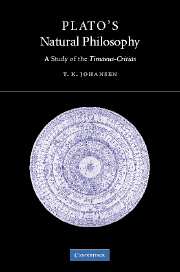Book contents
- Frontmatter
- Contents
- Acknowledgements
- Introduction: Plato's tales of teleology
- 1 What is the Timaeus-Critias about?
- 2 The status of the Atlantis story
- 3 The status of Timaeus' account
- 4 Teleology and craftsmanship
- 5 Necessity and teleology
- 6 Space and motion
- 7 Body, soul, and tripartition
- 8 Perception and cosmology
- 9 Dialogue and dialectic
- Epilogue
- Bibliography
- General index
- Index locorum
7 - Body, soul, and tripartition
Published online by Cambridge University Press: 03 September 2009
- Frontmatter
- Contents
- Acknowledgements
- Introduction: Plato's tales of teleology
- 1 What is the Timaeus-Critias about?
- 2 The status of the Atlantis story
- 3 The status of Timaeus' account
- 4 Teleology and craftsmanship
- 5 Necessity and teleology
- 6 Space and motion
- 7 Body, soul, and tripartition
- 8 Perception and cosmology
- 9 Dialogue and dialectic
- Epilogue
- Bibliography
- General index
- Index locorum
Summary
From the Phaedo we are familiar with the view of the body as a sort of prison for the soul. The body disrupts the proper workings of the soul, giving rise to irrationality in an essentially rational immortal soul. Embodiment is represented as a punishment for the soul. As Socrates puts it, ‘the philosopher's soul utterly despises his body and flees from it, seeking to be alone by itself’ (65d).
If this is our only impression of Plato's view of the relationship between the body and the soul, then reading the Timaeus may come as a surprise. For, as I aim to show, the dialogue offers a more complex and often more constructive view of the role of the body and the contribution it may make to our rationality and happiness. This view is based, I shall argue, on a detailed teleological account of the body and its relationship to the soul. I hope to show that readers of Plato who ignore the Timaeus risk getting a seriously incomplete picture of his thought on soul and body. This applies particularly to our understanding of the origin of the tripartite soul and the nature of soul–body interaction, where it might be argued that the Timaeus offers the most developed account of any Platonic dialogue.
The argument proceeds as follows. I start by sketching the composition of the world soul according to Timaeus. This is the necessary starting-point since the human soul has its origin in the world soul.
- Type
- Chapter
- Information
- Plato's Natural PhilosophyA Study of the Timaeus-Critias, pp. 137 - 159Publisher: Cambridge University PressPrint publication year: 2004



